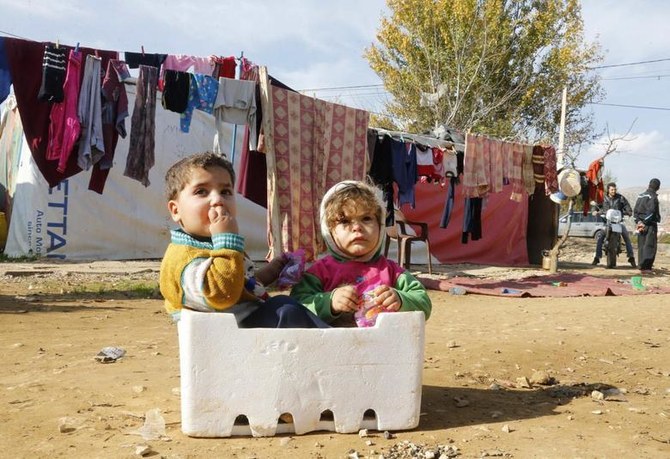LONDON: The UK’s decision to cut its funding for Syrian refugees, possibly by as much as 50 percent, will see children in the country and those displaced to neighboring states suffer disproportionately, Save the Children told Arab News on Wednesday.
Orlaith Minogue, senior conflict and humanitarian advocacy adviser at the charity, said children and mothers would “bear the brunt” of the cut, with access to education, food and healthcare set to be severely disrupted.
“The UK’s generous support has been key to delivering healthcare, education and protection services for Syrian families throughout the course of the conflict,” Minogue said.
“However, after yesterday’s announcement, we now face a situation where Syrian children will be left to bear the brunt of a dramatic aid cut from the UK, a decision that could have devastating consequences as aid agencies struggle to deliver the life-saving and sustaining support these children so desperately need.”
The UK offered £205 million ($281 million) at a virtual UN donor conference this week, down from £400 million given last year, as part of broader moves to slash international aid to rebalance the national budget following the coronavirus pandemic.
Those plans, set to reduce overseas aid from 0.7 to 0.5 percent of gross domestic product, had already raised fears that spending on a number of Arab countries — including Yemen, Lebanon and Libya — could be reduced dramatically.
These cuts, as well as those directly affecting Syria, could have serious knock-on effects for Syrian refugees, Minogue warned.
“The crisis in Syria, and for Syrians, isn’t over, and much of the progress in the region to date is at risk as a result of the impact of COVID-19 and increasing economic hardship,” she said.
“In northwest Syria, two-thirds of children are out of school and for many, they may never be able to return. In Lebanon, 90 percent of Syrian refugees are living in poverty without access to sufficient food,” she added.
“These figures only scratch the surface of the levels of need in Syria and neighboring countries. Any decision to reduce funding now risks the survival of the most vulnerable.”
Foreign Secretary Dominic Raab said the UK had given in excess of £3.5 billion in aid to help Syrian refugees since 2012, suggesting the current donation is proportionate to the size of the British economy.
But Save the Children’s CEO Kevin Watkins issued a statement calling the cut “disastrous,” adding: “The reduction will have a catastrophic impact. It could mean nearly half a million children missing out on education, and more than a hundred thousand mothers and children going hungry.”
He said: “This is just the tip of the iceberg; ultimately, lives could be lost because of this government’s decision to step back at a time when Syrians desperately need us to step up.
“This cut is yet another reminder of the catastrophic consequences of the government’s decision to break its promise to maintain the aid budget at 0.7 percent of national income and they must urgently rethink this approach.”
Jean-Michel Grand, executive director of the charity Action against Hunger, also condemned the cut.
“This is a region blighted by war, ravaged by COVID-19, and with an economy in freefall. In 10 years of conflict, the situation has never been worse,” he said in a statement.
“Back in November, the UK government told MPs it would continue to stand shoulder to shoulder with the Syrian people in their time of need. Cutting our aid commitment … represents no such solidarity or support,” he added.
“The world is watching to see what ‘global Britain’ truly means and so far the portents aren’t good. We slashed aid to Yemen, a country teetering on the brink of famine, and have followed suit by reducing support to Syria by 32 percent.”
The UN conference, which aimed to raise $10 billion for both internally displaced Syrians and refugees in neighboring countries, was only able to secure $6.4 billion, with just $4.4 billion being made available this year.
Despite the overall reduction in funding, several leading economies — including Germany, France and the US — did not reduce their spending pledges for Syria.
Germany offered £480 million for this year and the same amount next year. France pledged $657 million.
German Foreign Minister Heiko Maas told the conference that half the Syrian population needs aid, with 90 percent living in poverty. He added that at least 2.4 million Syrian children do not have access to schools.
“The Syrian tragedy must not last another 10 years,” Maas said. “Ending it begins by restoring hope. It begins with our commitments — here, today.”



























